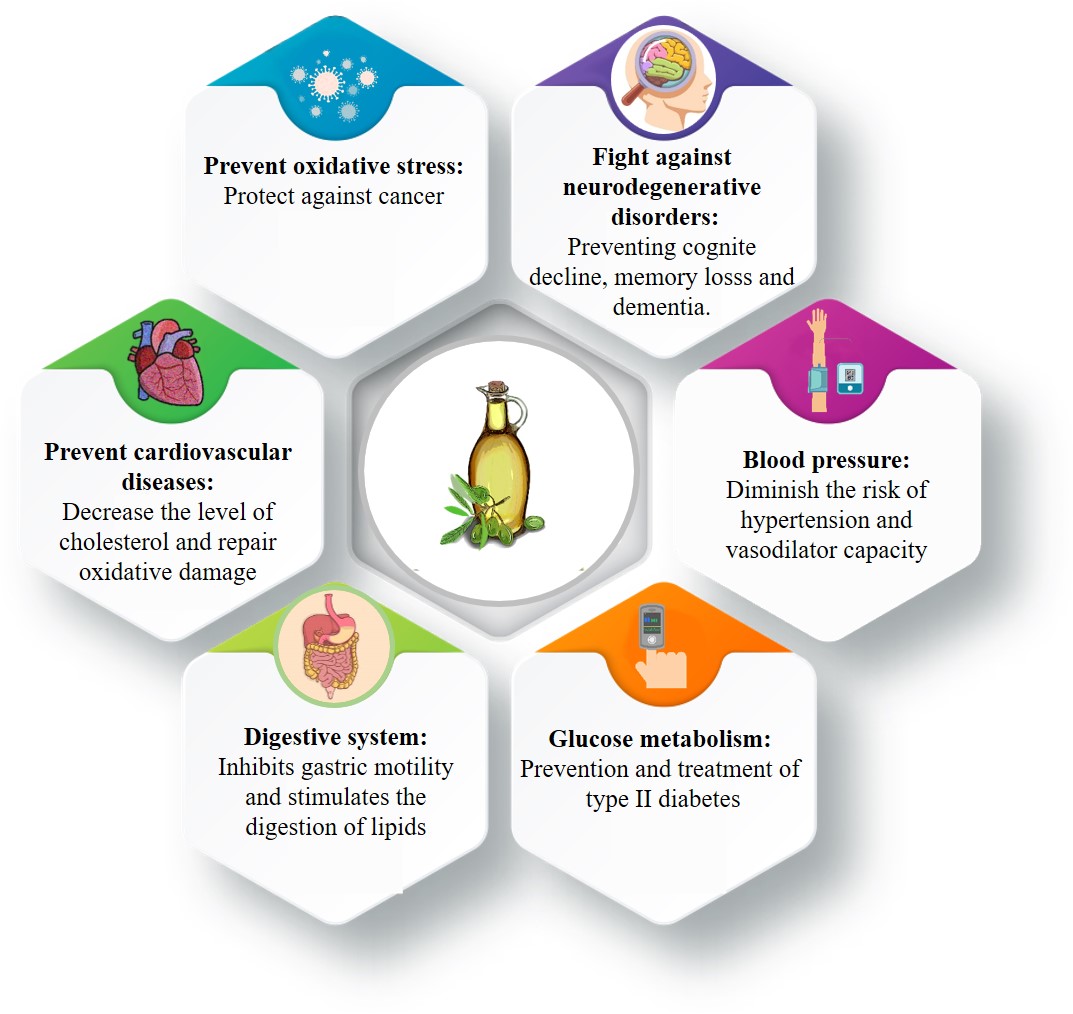Extra virgin olive oil is a real, genuine, and symbolic heritage of the Mediterranean Diet. This latter healthy, delicious eating habit is full of nutrients that keep us fit and well. It’s a lifestyle that’s all about fresh components, including the star of the show – OLIVE OIL! Rich in antioxidants and other beneficial compounds, this olive tree-derived product is a blooming food that’s been linked to a lower risk of cancer, heart disease and even neurodegenerative disorders like Alzheimer’s and Parkinson’s. Its incredible health benefits are down to its main bioactive compound, oleic acid, and other minor components, mainly phenolic compounds. Indeed, these metabolites are believed to confer a wide range of incredible benefits to this food matrix thanks to their powerful antioxidant properties against free radicals and other reactive oxygen species, which are believed to be key risk factors for various diseases (Chaji et al., 2024). In an exciting development, the potential health benefits of extra virgin olive oil have been officially recognized by the European Food Safety Authority in 2011. This marks a significant step forward in the official acknowledgement of the amazing properties of this incredible food! The health claim associates the phenolic fraction, particularly hydroxytyrosol and its derivatives, with the protection of blood lipids from oxidative stress.
Potent antioxidants, phenolic compounds, are believed to play a critical role in cellular defense against age-related disorders, as they are central contributors to the fight against neurodegenerative and cardiovascular diseases. For instance, hydroxytyrosol has shown incredible protective effects on retinal pigment epithelial cells against oxidative damage associated with age-related macular degeneration (Zhu et al., 2010). Another relevant study conducted by Tasset et al., (2011) has also revealed that hydroxytyrosol-rich extra virgin olive oil acts as an incredibly powerful brain antioxidant! It limits lipid peroxidation in the brain and prevents glutathione depletion. Similarly, there’s great news on the neuroprotective front. Compounds like oleuropein aglycone and oleocanthal have been shown to interact with amyloid-beta (Aβ) aggregates (Pitt et al., 2009; Rigacci et al., 2011). This provides amazing neuroprotective effects in Alzheimer’s disease.
The PREDIMED trial revealed even more amazing news about the incredible benefits of an EVOO-rich diet! It showed that this diet can significantly reduce inflammatory cytokines, vascular and intercellular adhesion molecules, increase high-density lipoprotein (HDL-c) levels, and reduce low-density lipoprotein (LDL-c) levels (Estruch et al., 2006). Other studies on both hypercholesterolemic patients have revealed that consuming phenol-enriched olive oil can significantly reduce the risk of developing cardiovascular disease (Konstantinidou et al., 2010; Pedret et al., 2018). Further, the naturally occurring simple phenol in olive oil, hydroxytyrosol, not only improves the levels of circulating lipids but also repairs oxidative damage, effectively mitigating cardiovascular risk factors (Kouli et al., 2019; Priore et al., 2015).
The phenolic antioxidants in extra virgin olive oil also show great promise in the fight against cancer! Excitingly, oleuropein glucosides, hydroxytyrosol, and tyrosol have been identified as potential chemopreventive agents, primarily through their ability to prevent DNA oxidative damage across various cell types (Casaburi et al., 2013). These compounds also have the great ability to stop the growth of tumours in cancers such as leukaemia, colorectal and breast cancer (Corominas-Faja et al., 2018). They do this by stopping cells from multiplying and promoting apoptosis. It is also worth noting that oleacein, a phenolic compound known to be present in olive oil, has been linked to suppressing cancer stem cell traits in breast cancer, with oleuropein and hydroxytyrosol also showing promise in inhibiting breast cancer cell proliferation by targeting estrogen-dependent signaling pathways that foster tumour growth (Sirianni et al., 2010).
The benefits of extra virgin olive oil go on and on! Not only is it a delicious addition to any meal, but its phenolic compounds may also help manage type 2 diabetes. How? By reducing insulin resistance and downregulating pro-inflammatory cytokines, including TNF-α (Lozano-Castellón et al., 2020). In an interesting study, Rigacci and colleagues revealed that oleuropein aglycone has the incredible ability to prevent the toxic aggregation of amylin, a protein involved in type 2 diabetes (Rigacci et al., 2010). The great news just keeps on coming! A Mediterranean diet enriched with EVOO has also been shown to significantly lower diabetes risk in individuals with high cardiovascular risk (Salas-Salvadó et al., 2014).
And there’s more! The fantastic omega 6 to omega 3 ratio in EVOO is in line with the nutrition guidelines, which say that this balance can help to prevent a wide range of health issues (Hashempour-Baltork et al., 2018). So, it’s clear that EVOO is one of the best sources of natural fat out there!
Given all of these incredible benefits, it’s clear that extra virgin olive oil plays a vital role in the Mediterranean Diet (MD). This model of healthy eating is not only delicious and nutritious but also has the potential to drastically reduce and even prevent a range of health issues. It’s a fantastic way to “encourage the younger generation to embrace healthy, bioactive diets rich in essential nutrients”.
References
Casaburi, I., Puoci, F., Chimento, A., Sirianni, R., Ruggiero, C., Avena, P., & Pezzi, V. (2013). Potential of olive oil phenols as chemopreventive and therapeutic agents against cancer: A review of in vitro studies. Molecular Nutrition and Food Research, 57, 71–83. https://doi.org/10.1002/mnfr.201200503
Chaji, S., Bajoub, A., Cravotto, C., Voss, M., Tabasso, S., Hanine, H., & Cravotto, G. (2024). Metabolomics in action: Towards producing authentic virgin olive oil rich in bioactive compounds and with distinctive organoleptic features. LWT, 191, 115681. https://doi.org/10.1016/j.lwt.2023.115681
Corominas-Faja, B., Cuyàs, E., Lozano-Sánchez, J., Cufí, S., Verdura, S., Fernández-Arroyo, S., Borrás-Linares, I., Martin-Castillo, B., Martin, Á. G., Lupu, R., Nonell-Canals, A., Sanchez-Martinez, M., Micol, V., Joven, J., Segura-Carretero, A., & Menendez, J. A. (2018). Extra-virgin olive oil contains a metabolo-epigenetic inhibitor of cancer stem cells. Carcinogenesis, 39(4), 601–613. https://doi.org/10.1093/carcin/bgy023
Estruch, R., Martínez-González, M. A., Corella, D., Salas-Salvadó, J., Ruiz-Gutiérrez, V., Covas, M. I., Fiol, M., Gómez-Gracia, E., López-Sabater, M. C., Vinyoles, E., Arós, F., Conde, M., Lahoz, C., Lapetra, J., Sáez, G., Ros, E., & Investigators, P. S. (2006). Effects of a Mediterranean-style diet on cardiovascular risk factors: A randomized trial. Annals of Internal Medicine, 145(1), 1–11. https://doi.org/10.7326/0003-4819-145-1-200607040-00004
Hashempour-Baltork, F., Torbati, M., Azadmard-Damirchi, S., & Savage, G. P. (2018). Chemical, rheological and nutritional characteristics of sesame and olive oils blended with linseed oil. Advanced Pharmaceutical Bulletin, 8(1), 107–113. https://doi.org/10.15171/apb.2018.013
Konstantinidou, V., Covas, M., Muñoz‐Aguayo, D., Khymenets, O., Torre, R., Saez, G., Carmen Tormos, M., Toledo, E., Marti, A., Ruiz‐Gutiérrez, V., Mendez, M. V. R., & Fito, M. (2010). In vivo nutrigenomic effects of virgin olive oil polyphenols within the frame of the Mediterranean diet: A randomized controlled trial. The FASEB Journal, 24(7), 2546–2557. https://doi.org/10.1096/fj.09-148452
Kouli, G.-M., Panagiotakos, D. B., Kyrou, I., Magriplis, E., Georgousopoulou, E. N., Chrysohoou, C., Tsigos, C., Tousoulis, D., & Pitsavos, C. (2019). Olive oil consumption and 10-year (2002–2012) cardiovascular disease incidence: The ATTICA study. European Journal of Nutrition, 58, 131–138. https://doi.org/10.1007/s00394-017-1577-x
Lozano-Castellón, J., López-Yerena, A., De, J. F. R. A., Castillo-Alba, J. R. del, Vallverdú-Queralt, A., Elvira, E.-F., & Lamuela-Raventós, R. M. (2020). Health-promoting properties of oleocanthal and oleacein: Two secoiridoids from extra-virgin olive oil. Critical Reviews in Food Science and Nutrition, 60(15), 2532–2548. https://doi.org/10.1080/10408398.2019.1650715
Pedret, A., Fernández-Castillejo, S., Valls, R. M., Catalán, Ú., Rubió, L., Romeu, M., Macià, A., López de las Hazas, M. C., Farràs, M., Giralt, M., Mosele, J. I., Martín-Peláez, S., Remaley, A. T., Covas, M. I., Fitó, M., Motilva, M. J., & Solà, R. (2018). Cardiovascular benefits of phenol-enriched virgin olive oils: New insights from the virgin olive oil and HDL functionality (VOHF) study. Molecular Nutrition and Food Research, 62(16), 1800456. https://doi.org/10.1002/mnfr.201800456
Pitt, J., Roth, W., Lacor, P., 3rd, A. B. S., Blankenship, M., Velasco, P., Felice, F. De, Breslin, P., & Klein, W. L. (2009). Alzheimer’s-associated Abeta oligomers show altered structure, immunoreactivity and synaptotoxicity with low doses of oleocanthal. Toxicology and Applied Pharmacology, 240(2), 189–197. https://doi.org/10.1016/j.taap.2009.07.018
Priore, P., Caruso, D., Siculella, L., & Gnoni, G. V. (2015). Rapid down-regulation of hepatic lipid metabolism by phenolic fraction from extra virgin olive oil. European Journal of Nutrition, 54(5), 823–833. https://doi.org/10.1007/s00394-014-0761-5
Rigacci, S., Guidotti, V., Bucciantini, M., Nichino, D., Relini, A., Berti, A., & Stefani, M. (2011). Aβ(1-42) aggregates into non-toxic amyloid assemblies in the presence of the natural polyphenol oleuropein aglycon. Current Alzheimer Research, 8(8), 841–852. https://doi.org/10.2174/156720511798192682
Rigacci, S., Guidotti, V., Bucciantini, M., Parri, M., Nediani, C., Cerbai, E., Stefani, M., & Berti, A. (2010). Oleuropein aglycon prevents cytotoxic amyloid aggregation of human amylin. Journal of Nutritional Biochemistry, 21(8), 726–735. https://doi.org/10.1016/j.jnutbio.2009.04.010
Salas-Salvadó, J., Bulló, M., Estruch, R., Ros, E., Covas, M.-I., Ibarrola-Jurado, N., Corella, D., Arós, F., Gómez-Gracia, E., Ruiz-Gutiérrez, V., Romaguera, D., Lapetra, J., Lamuela-Raventós, R. M., Serra-Majem, L., Pintó, X., Basora, J., Muñoz, M. A., Sorlí, J. V., & Martínez-González, M. A. (2014). Prevention of diabetes with Mediterranean diets. Annals of Internal Medicine, 160(1), 1–10. https://doi.org/10.7326/L14-5014
Sirianni, R., Chimento, A., de Luca, A., Casaburi, I., Rizza, P., Onofrio, A., Iacopetta, D., Puoci, F., Andò, S., Maggiolini, M., & Pezzi, V. (2010). Oleuropein and hydroxytyrosol inhibit MCF-7 breast cancer cell proliferation interfering with ERK1/2 activation. Molecular Nutrition and Food Research, 54(6), 833–840. https://doi.org/10.1002/mnfr.200900111
Tasset, I., Pontes, A. J., Hinojosa, A. J., de la Torre, R., & Túnez, I. (2011). Olive oil reduces oxidative damage in a 3-nitropropionic acid-induced huntington’s disease-like rat model. Nutritional Neuroscience, 14(3), 106–111. https://doi.org/10.1179/1476830511Y.0000000005
Zhu, L., Liu, Z., Feng, Z., Hao, J., Shen, W., Li, X., Sun, L., Sharman, E., Wang, Y., Wertz, K., Weber, P., Shi, X., & Liu, J. (2010). Hydroxytyrosol protects against oxidative damage by simultaneous activation of mitochondrial biogenesis and phase II detoxifying enzyme systems in retinal pigment epithelial cells. Journal of Nutritional Biochemistry, 21(11), 1089–1098. https://doi.org/10.1016/j.jnutbio.2009.09.006




